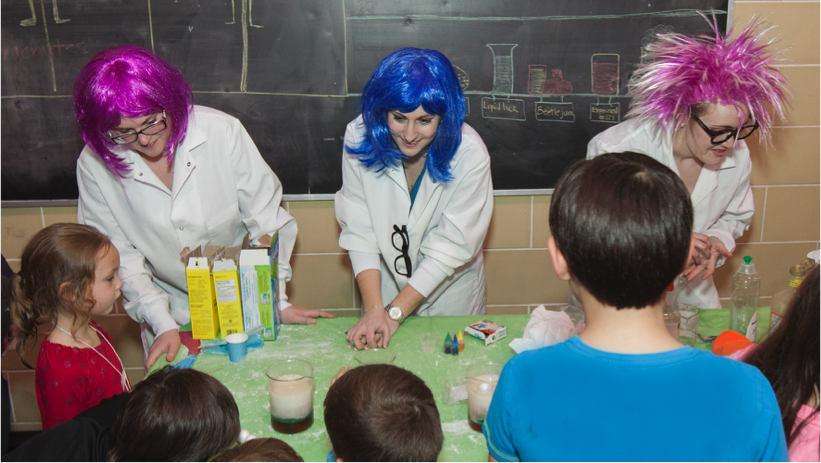|
By Julie Wolf
Using your scientific education to help others is a rewarding way to spend extracurricular time during college or grad school. Why? From the satisfied feeling of giving back to a community, to engaging a younger generation in science; from mentoring a young Scientista, to sharing scientific results with a lay audience, the possible return on your investment is large. There are all sorts of ways to volunteer your time effectively. Before committing to an outreach project, ask yourself: 1. What type of commitment will this entail? How many hours per week, and for how long? 2. What is the goal of this organization? Is there a mission statement? Do you agree with the goals and ideals of the organization? 3. Who is your audience? Will you be interacting with elementary school students, college students, or adults? How large a group will you be working with? Reviewing these questions can help you tailor your search for groups and clubs with the best fit for you. Consider just a few of the possible ways listed here: Non-profit organizations (NPO) Non-profit organizations depend on the generosity of volunteers, especially during fundraising endeavors, which in turn can support important research. They often have a range of roles that Scientistas can get involved with! Pros: You develop and gain new skills. These roles often provide great networking opportunities. Cons: Most roles require an application process and can be competitive Ones to try: Nationwide: The Scientista Foundation has many opportunities for involvement including starting a Scientista chapter on your campus, joining the national team, writing for the website and more. Find out more at http://www.scientistafoundation.com/ Nationwide: http://www.cancer.org/involved/volunteer/ Nationwide: http://www.alz.org/join_the_cause_volunteer.asp NY: http://www.amnh.org/join-support/volunteer-now DC: http://www.si.edu/Volunteer Science fairs Science fairs often need volunteer judges to help evaluate student entries. These can range from middle-school to high-school students presenting posters or projects. These student presentations exemplify an important aspect of the scientific process, communicating results. Pros: You get to interact with many bright students. You can evaluate entries and play a role in determining prizes. The once -a-year scheduling means a small time commitment. Cons: Spending only a few minutes with many students means little long-term impact. You may experience a dawning realization that students years younger than you, are more sophisticated than you were at that age. Ones to try: National: The Scientista Foundation - Stay tuned to www.scientistafundation.com for the application to be volunteer judge for the Scientista Foundation's 2015 fair, which will be coming soon! Check out last year's science fair here: http://www.scientistafoundation.com/symposium-2014.html NY: http://nyssef.org/home/ CA: http://www.usc.edu/CSSF/ MN: http://mnmas.org/science-engineering-fair/judges Café Scientifique Café Scientifique and other science-and-society organizations bring in experts to talk about their field with members of the community. Pros: You can present your research to a large lay audience. Alternatively, you can help invite and schedule local scientists to share their knowledge. Cons: There may be a long waiting period for presentation slots. The café may require presenters to have a graduate degree (but you can still go to learn something new!). Ones to try: Nationwide: http://www.cafescientifique.org NY: http://secretscienceclub.blogspot.com Tutoring Tutoring is a great way to pass your knowledge to a young Scientista. It’s also a way to forge a positive long-term relationship with a student over the course of a semester, year, or years. Pros: You can help younger students grasp subjects you have worked so hard to master. You will watch students grow understanding over time. Cons: Weekly or biweekly meetings make it difficult for a short-term commitment. Ones to try: PA: http://citywidemathscience.com/contact-us/about-tutoring-positions CA: http://www.tutoringinla.com/tutoring-opportunities/ Alternative Spring Break Alternative Spring Break (ASB) is a one-week trip during which college students volunteer for a cause close to their heart. Many colleges have ASB programs with science- or health-related causes that Scientistas may enjoy. Pros: You can spend your Spring Break away from campus, maybe even another country. You can form lifelong friendships with your ASB team. Cons: You may have to fundraise or cover the cost of your own trip. Team selection can be competitive and you may not get your first choice trip. Ones to try: KY: https://ci.uky.edu/lis/asb TX: https://cic.rice.edu/asb/ FL: http://www.eckerd.edu/servicelearning/servicetrips/ There are many, many other ways to volunteer your time, both here in the U.S. and overseas. This list concentrates on American volunteer experiences but dozens exist in other parts of the world! If you have a favorite organization, leave a link to it below in the comments for other Scientistas to find! 
About the Author
Julie Wolf is a research scientist studying infectious disease at Albert Einstein College of Medicine in New York. She is passionate about increasing scientific literacy and improving scientific communication in traditional and nontraditional settings. Julie has taught at CUNY Bronx Community College, Long Island University, and the Brooklyn-based community biolab, Genspace. She writes for Scholastic Science World and the Scientista Foundation. Comments? Leave them below!
0 Comments
Your comment will be posted after it is approved.
Leave a Reply. |
LIFESTYLE BLOGRead our lifestyle advice, written exclusively for pre-professional women in science and engineering. From advice about fashion, work and family balance, self, wellness, and money, we've got you covered! |
The Scientista Foundation, Inc. All Rights Reserved © 2011-2021 | Based in NY | [email protected]
The Network for Pre-Professional Women in Science and Engineering
The Scientista Foundation is a registered 501(c)(3) -- Donate!
The Network for Pre-Professional Women in Science and Engineering
The Scientista Foundation is a registered 501(c)(3) -- Donate!

